Nashville, Tennessee Blood Testing Facilities
 Represents a LabCorp blood testing facility
Represents a LabCorp blood testing facility Represents a Quest Diagnostics blood testing facility
Represents a Quest Diagnostics blood testing facility

Nearby Labcorp Blood Testing facilities:
- Labcorp Center Distance: 7 m, 1400 Donelson Pike Ste B10, Nashville, Davidson County, TN, 37217
- Labcorp Center Distance: 29 m, 5421 Main Street, Spring Hill, Maury County, TN, 37174
- Labcorp Center Distance: 40 m, 286 Clear Sky Court Suite C, Clarksville, Montgomery County, TN, 37043
- Labcorp Center Distance: 41 m, 1220 Trotwood, Columbia, Maury County, TN, 38401
- Labcorp Center Distance: 45 m, 130 Lebanon Hwy, Carthage, Smith County, TN, 37030
- Labcorp Center Distance: 46 m, 158 Hospital Dr, Carthage, Smith County, TN, 37030
- Labcorp Center Distance: 68 m, 2121 North Locust Avenue, Lawrenceburg, Lawrence County, TN, 38464
- Labcorp Center Distance: 72 m, 1080 Neal St Ste 201, Cookeville, Putnam County, TN, 38501
- Labcorp Center Distance: 90 m, 100 Medical Center Drive, Princeton, Caldwell County, KY, 42445
- Labcorp Center Distance: 93 m, 1878 Jeff Rd. Ste F, Huntsville, Madison County, AL, 35806
Nearby Quest Blood Testing facilities:
- Quest Center Distance: 1 m, 1916 Patterson St, Nashville, Davidson County, TN, 37203-2164
- Quest Center Distance: 14 m, 2001 Mallory Ln, Franklin, Williamson County, TN, 37067-8233
- Quest Center Distance: 25 m, 115 Winwood Dr, Lebanon, Wilson County, TN, 37087-3133
- Quest Center Distance: 28 m, 536 N. Thompson Lane Ste F, Murfreesboro, Rutherford County, TN, 37129-4301
- Quest Center Distance: 39 m, 751 Chesapeake Ln Ste 103, Clarksville, Montgomery County, TN, 37040-5263
- Quest Center Distance: 99 m, 806 Governors Dr Sw, Huntsville, Madison County, AL, 35801-5133
Nashville Hormone Replacement Therapy Services
Have you truly considered all of your options regarding your long term health and wellness? Have you ever thought about getting your Hormone Levels checked? Perhaps you've thought about it, but don't know how to breach the subject with your doctor? The Conscious Evolution Institute is Nashville's top source for quality Hormone Optimization and Balancing, and we make it easy to learn the truth about your underlying Hormone State, and provide you with a host of options designed to improve your vitality and combat certain, avoidable aspects of aging and health decline.
If you are interested in Hormone Therapy, we strongly encourage you to give us a call. We have friendly specialists on hand that can provide you with a free consultation, describing the therapies and techniques that we use and how they can potentially benefit you. We have affiliate medical professionals all throughout the Nashville metropolitan area that can perform the physical and blood drawing necessary to provide you with an accurate and clear evaluation of your underlying Hormone State. If you qualify for HRT Treatment, we can have your Hormone Treatment delivered directly to your home! Call us today!
Nashville Low-T Therapy for Testosterone Deficiency
Testosterone Replacement Therapy is one of the many fine therapies that we provide at the Conscious Evolution Institute. As research continues to grow, highlighting the importance of healthy Testosterone Levels, the popularity of Testosterone Creams, Patches, and Injections continues to grow. Testosterone is the most important male hormone, and plays a huge role in preserving the optimal health and wellness of a man. Testosterone Levels peak during the late teens and early twenties and remain high until around the age of thirty, when they start to slowly fall.
Of course, it may take years or even decades for this decline to become symptomatic, but the issues related to Testosterone Deficiency are serious—weight gain, erectile dysfunction, cardiovascular complications, and an increased risk of hypertension and diabetes are just a few of the symptoms associated with the condition. Let us measure your Testosterone Levels and help you discover if you qualify for revitalizing Testosterone HRT Treatment.
Nashville HGH Therapy for Hypopituitarism and Human Growth Hormone Deficiency
Human Growth Hormone Deficiency is not as common as Low-T, but it is just as serious of a medical condition. HGH is one of the body's primary metabolic hormones, and helps keep the body running at optimal capacity. Human Growth Hormone stimulates cellular metabolism, and, in doing so, impacts the function of nearly every system in the human body. Symptoms of HGH Deficiency include unexplained weight gain, loss of exercise capacity, fatigue and lack of energy, reduced libido, increased incidence of fine lines and wrinkles, and increased cholesterol. If our tests indicate that you are suffering from Human Growth Hormone Deficiency, we can deliver HGH Therapy products directly to your home or business.
Nashville Sermorelin Acetate Alternative to HGH
In addition to HGH Therapy, the Conscious Evolution Institute also offers a quality medical treatment known as Sermorelin Acetate Therapy. Sermorelin is another HRT Therapy which has the ability to safely and effectively restore natural Human Growth Hormone Balance, even more effectively than Bio-Identical HGH for some patients. Sermorelin is the functional analog of another hormone known as Growth Hormone-Releasing Hormone, or GH-RH. GH-RH works by directly stimulating the body to produce its own natural Human Growth Hormone. Most patients with Age-Related HGH Deficiency have perfectly healthy pituitaries, which simply don't get enough signal for HGH Production. Sermorelin is cheaper than Human Growth Hormone and can be prescribed off-label, which means that your doctor can prescribe you with Sermorelin even if you don't necessarily qualify for Bio-Identical Human Growth Hormone.
Nashville Injectable HCG for Weight Loss
Our clinic also offers medical therapies designed to help patients lose weight, one of which is HCG Therapy. HCG is a Bio-Identical Hormone that has been shown to promote significant weight loss when combined with a low-calorie diet. HCG works by simultaneously suppressing the feeling of hunger while promoting bodyfat metabolism and preserving muscle mass. Patients that have used HCG report weight loss of up to a pound per day with this diet. If you've considered options like gastric bypass surgery, think about trying HCG first. Call us today!
Nashville, Tennessee Information
Nashville is the largest city in the state of Tennessee, as well as the capital of the state. Nashville is famously known for being the most important city in country music, and men and women from around the country come to Nashville in order to further their music career. Nashville goes by two common nicknames:The Athens of the South, and the Music City. The city is home to a variety of music studios representing a number of genres, so there are a host of studio musicians that call Nashville home as well. The Country Music Hall of Fame and the Grand Ole Opry are both located in Nashville. The city was first named the Athens of the South, because of the writers and intellectuals that flourished in the city.
Nashville is also a fantastic sports town, with a number of professional sports teams, including the Nashville Predators, the Tennessee Titans, and Nashville FC. The university of Vanderbilt is also located in Nashville, which is the only private university in the Southeastern Athletic Conference, or the SEC.
The city of Nashville has a strong economy, with a strong emphasis on healthcare, education, government and entertainment. The largest employers in the city of Nashville are public, government jobs, including the Nashville education system and Vanderbilt University. Other major employers include the Hospital Corporation of America, Nissan, and Saint Thomas Health Services.
There are a variety of things to see and do in Nashville. The most famous entertainment venue in Nashville is the Ryman Auditorium, but there are other excellent places to see live theater and music, including the Belcourt Theatre. In addition to being a center for country music, the city is also a hotbed for gospel music. Annual festivals and events in Nashville include the CMA Awards, the Southern Festival of Books, and the Nashville Film Festival.
All About Nashville, Tennessee Geographic Area
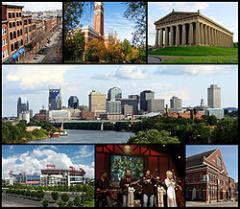


Nashville is the capital of the U.S. state of Tennessee and the county seat of Davidson County. It is located on the Cumberland River in the north-central part of the state. The city is a center for the health care, publishing, banking and transportation industries, and is home to a large number of colleges and universities. Reflecting the city's position in state government, Nashville is home to the Tennessee Supreme Court's courthouse for Middle Tennessee. It is most notably known as a center of the music industry, earning it the nickname "Music City".
Nashville has a consolidated city aecounty government which includes six smaller municipalities in a two-tier system. As of the 2010 census the population of the city of Nashville, not including the semi-independent municipalities, stood at 601,222. The population of Davidson County as a whole, including all municipalities, was 626,681. Nashville is the second largest city in Tennessee, after Memphis, and the fourth largest city in the Southeastern United States. The 2010 population of the entire 13-county Nashville metropolitan area was 1,589,934, making it the largest Metropolitan Statistical Area in the state. The 2010 population of the Nashville-Davidson aeMurfreesboro aeColumbia combined statistical area, a larger trade area, was 1,670,890.
The town of Nashville was founded by James Robertson, John Donelson, and a party of Overmountain Men in 1779, near the original Cumberland settlement of Fort Nashborough. It was named for Francis Nash, the American Revolutionary War hero. Nashville quickly grew because of its strategic location, accessibility as a river port, and its later status as a major railroad center. In 1806, Nashville was incorporated as a city and became the county seat of Davidson County, Tennessee. In 1843, the city was named the permanent capital of the state of Tennessee.
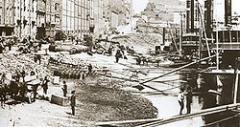
By 1860, when the first rumblings of secession began to be heard across the South, antebellum Nashville was a very prosperous city. The city's significance as a shipping port made it a desirable prize as a means of controlling important river and railroad transportation routes. In February 1862, Nashville became the first state capital to fall to Union troops. The Battle of Nashville (December 15 ae16, 1864) was a significant Union victory and perhaps the most decisive tactical victory gained by either side in the war.
Within a few years after the Civil War the city had reclaimed its important shipping and trading position and also developed a solid manufacturing base. The post aeCivil War years of the late 19th century brought a newfound prosperity to Nashville. These healthy economic times left the city with a legacy of grand classical-style buildings, which can still be seen around the downtown area.
Since the 1970s, the city has experienced tremendous growth, particularly during the economic boom of the 1990s under the leadership of then-Mayor and later-Tennessee Governor, Phil Bredesen, who made urban renewal a priority, and fostered the construction or renovation of several city landmarks, including the Country Music Hall of Fame and Museum, the downtown Nashville Public Library, the Bridgestone Arena, and LP Field.
LP Field (formerly Adelphia Coliseum) was built after the National Football League's (NFL) Houston Oilers agreed to move to the city in 1995. The NFL team debuted in Nashville in 1998 at Vanderbilt Stadium, and LP Field opened in the summer of 1999. The Oilers changed their name to the Tennessee Titans and saw a season culminate in the Music City Miracle and a close Super Bowl game that came down to the last play.
In 1997 Nashville was awarded an NHL expansion team which was subsequently named the Nashville Predators. Since coming into the league the team has made the playoffs every season except one, and has only ever had one head coach, Barry Trotz.
Today, the city along the Cumberland River is a crossroads of American culture, and one of the fastest-growing areas of the Upland South.
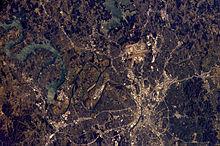
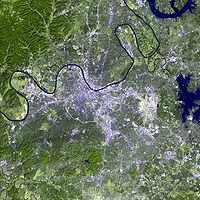
Nashville lies on the Cumberland River in the northwestern portion of the Nashville Basin. Nashville's topography ranges from 385 feet (117 m) above sea level at the Cumberland River to 1,160 feet (350 m) above sea level at its highest point.
According to the United States Census Bureau, the city has a total area of 527.9 square miles (1,367 km2), of which 504.0 square miles (1,305 km2) of it is land and 23.9 square miles (62 km2) of it (4.53%) is water.
Nashville has a humid subtropical climate (Koppen Cfa), with generally cool to moderately cold winters, and hot, humid summers. Monthly averages range from 38.1 °F (3.4 °C) in January to 79.9 °F (26.6 °C) in July, with a diurnal temperature variation of 18.5 to 23 °F (10 to 13 °C). In the winter months, snowfall does occur in Nashville but is usually not heavy. Average annual snowfall is about 5.8 inches (15 cm), falling mostly in January and February and occasionally March and December. The largest snow event since 2000 was on January 16, 2003, when Nashville received 7 inches (18 cm) of snow in a single storm; the largest on record was 17 inches (43 cm), received on March 17, 1892. Rainfall is typically greater in winter and spring while autumn is the driest. Spring and fall are generally warm but prone to severe thunderstorms, which occasionally bring tornadoes ae with recent major events on April 16, 1998; April 7, 2006; February 5, 2008; April 10, 2009; and May 1 ae2, 2010. Relative humidity in Nashville averages 83% in the mornings and 60% in the afternoons, which is considered moderate for the Southeastern United States. In recent decades, due to urban development, Nashville has developed an urban heat island (UHI); especially on cool, clear nights, temperatures are up to 10 °F (5.6 °C) warmer in the heart of the city than in rural outlying areas. The entire Nashville region lies within USDA Plant Hardiness Zone 7a.
Nashville's long springs and autumns combined with a diverse array of trees and grasses can often make it uncomfortable for allergy sufferers. In 2008, Nashville was ranked as the 18th-worst spring allergy city in the U.S. by the Asthma and Allergy Foundation of America.
The coldest temperature ever recorded in Nashville was na17 °F ( na27 °C) on January 21, 1985, and the highest was 109 °F (43 °C) on June 29, 2012.
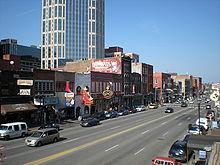
The downtown area of Nashville features a diverse assortment of entertainment, dining, cultural and architectural attractions. The Broadway and 2nd Avenue areas feature entertainment venues, night clubs and an assortment of restaurants. North of Broadway lies Nashville's central business district, Legislative Plaza, Capitol Hill and the Tennessee Bicentennial Mall. Cultural and architectural attractions can be found throughout the city.
The downtown area of Nashville is easily accessible. Three major interstate highways (I-40, I-65 and I-24) converge near the core area of downtown, and many regional cities are within a day's driving distance.
Nashville's first skyscraper, the Life & Casualty Tower, was completed in 1957 and started the construction of high rises in downtown Nashville. After the construction of the AT&T Building (commonly known to locals as the "Batman Building") in 1994, the downtown area saw little construction until the mid-2000s. Many new residential developments have been constructed or are planned for the various neighborhoods of downtown and midtown. A new high rise office building, The Pinnacle, was recently opened in 2010.
Many civic and infrastructure projects are either being planned, in progress, or recently completed. A new MTA bus hub was recently completed in downtown Nashville, as was the Music City Star pilot project. Several public parks have been constructed, such as the Public Square. Riverfront Park is scheduled to be extensively updated. The Music City Center, a convention center project, has been approved for the downtown area and is currently under construction.
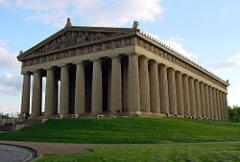
Metro Board of Parks and Recreation owns and manages 10,200 acres (4,100 ha) of land and 99 parks and greenways (comprising more than 3% of the total area of the county).
Warner Parks, situated on 2,684 acres (1,086 ha) of land, consists of a 5,000-square-foot (460 m2) learning center, 20 miles (32 km) of scenic roads, 12 miles (19 km) of hiking trails, and 10 miles (16 km) of horse trails. It is also the home of the annual Iroquois Steeplechase.
The United States Army Corps of Engineers maintains parks on Old Hickory Lake and Percy Priest Lake. These parks are used for activities such as fishing, waterskiing, sailing and boating. The Harbor Island Yacht Club makes its headquarters on Old Hickory Lake, and Percy Priest Lake is home to the Vanderbilt Sailing Club.
Other notable parks in Nashville include Centennial Park, Shelby Park, Cumberland Park, and Radnor Lake State Natural Area.
Nashville has the largest metropolitan area in the state of Tennessee, spanning 13 counties and, as of 2009[update], had a population of 1,582,264. The Nashville Metropolitan Statistical Area encompasses the Middle Tennessee counties of Cannon, Cheatham, Davidson, Dickson, Hickman, Macon, Robertson, Rutherford, Smith, Sumner, Trousdale, Williamson, and Wilson. The 2009 population of the Nashville-Davidson aeMurfreesboro aeColumbia combined statistical area was estimated at 1,666,210.
Much of the city's cultural life has revolved around its large university community. Particularly significant in this respect were two groups of critics and writers who were associated with Vanderbilt University in the early twentieth century: the Fugitives and the Agrarians.
Popular destinations include Fort Nashborough and Fort Negley, the former being a reconstruction of the original settlement, the latter being a semi-restored Civil War battle fort; the Tennessee State Museum; and The Parthenon, a full-scale replica of the original Parthenon in Athens. The Tennessee State Capitol is one of the oldest working state capitol buildings in the nation, while The Hermitage is one of the older presidential homes open to the public.
Although best known for its music, Nashville is a city filled with countless dining destinations. Some of the more popular types of local cuisine include hot chicken, hot fish, barbecue, and meat and three.
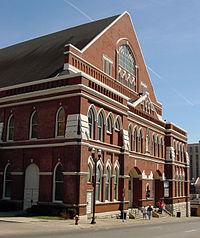
Nashville has a vibrant music and entertainment scene spanning a variety of genres. The Tennessee Performing Arts Center is the major performing arts center of the city. It is the home of the Tennessee Repertory Theatre, the Nashville Opera, the Music City Drum and Bugle Corps, and the Nashville Ballet. In September 2006, the Schermerhorn Symphony Center opened as the home of the Nashville Symphony.
As the city's name itself is a metonym for the country music industry, many popular tourist sites involve country music, including the Country Music Hall of Fame and Museum, Belcourt Theatre, and Ryman Auditorium. Ryman was home to the Grand Ole Opry until 1974 when the show moved to the Grand Ole Opry House, 9 miles (14 km) east of downtown. The Opry plays there several times a week, except for an annual winter run at the Ryman.
Numerous music clubs and honky-tonk bars can be found in downtown Nashville, especially the area encompassing Lower Broadway, Second Avenue, and Printer's Alley, which is often referred to as "the District".
Each year, the CMA Music Festival (formerly known as Fan Fair) brings thousands of country fans to the city. The Tennessee State Fair is also held annually in September.
Nashville was once home of television shows such as Hee Haw and Pop! Goes the Country, as well as The Nashville Network. Country Music Television, RFD TV, and Great American Country currently operate from Nashville. The city was also home to the Opryland USA theme park, which operated from 1972 to 1997 before being closed by its owners (Gaylord Entertainment Company) and soon after demolished to make room for the Opry Mills mega-shopping mall.
The Christian pop and rock music industry is based along Nashville's Music Row, with a great influence in neighboring Williamson County. The Christian record companies include EMI Christian Music Group, Provident Label Group and Word Records.
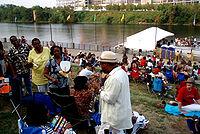
Although Nashville was never known as a jazz town, it did have many great jazz bands, including The Nashville Jazz Machine led by Dave Converse and its current version, the Nashville Jazz Orchestra, led by Jim Williamson, as well as The Establishment, led by Billy Adair. The Francis Craig Orchestra entertained Nashvillians from 1929 to 1945 from the Oak Bar and Grille Room in the Hermitage Hotel. Craig's orchestra was also the first to broadcast over local radio station WSM-AM and enjoyed phenomenal success with a 12-year show on the NBC Radio Network. In the late 1930s, he introduced a newcomer, Dinah Shore, a local graduate of Hume Fogg High School and Vanderbilt University.
Radio station WMOT-FM in nearby Murfreesboro has aided significantly in the recent revival of the city's jazz scene, as has the non-profit Nashville Jazz Workshop, which holds concerts and classes in a renovated building in the north Nashville neighborhood of Germantown. Fisk University also maintains a jazz station.
Nashville has an active theatre scene, having several professional and community theatre companies. Most notable of the professional companies are Nashville Children's Theatre, Tennessee Repertory Theatre, the Nashville Shakespeare Festival, the Dance Theatre of Tennessee and the Tennessee Women's Theater Project. Of the community theatres, Circle Players has been in operation for over 60 years.
Perhaps the biggest factor in drawing visitors to Nashville is its association with country music. Many visitors to Nashville attend live performances of the Grand Ole Opry, the world's longest running live radio show. The Country Music Hall of Fame and Museum is another major attraction relating to the popularity of country music. The Gaylord Opryland Resort & Convention Center, the Opry Mills regional shopping mall and the General Jackson showboat, are all located in what is known as Music Valley.
Civil War history is important to the city's tourism industry. Sites pertaining to the Battle of Nashville and the nearby Battle of Franklin and Battle of Stones River can be seen, along with several well-preserved antebellum plantation houses such as Belle Meade Plantation, Carnton plantation in Franklin, and Belmont Mansion.
Nashville has several arts centers and museums, including the Frist Center for the Visual Arts, Cheekwood Botanical Garden and Museum of Art, the Tennessee State Museum, Fisk University's Van Vechten and Aaron Douglas Galleries, Vanderbilt University's Fine Art Gallery and Sarratt Gallery, and the Parthenon. Nashville West is one of the city's newer attractions.
Nashville hosted a team called the Nashville Rebels which participated in the 1938 American Football League, and two Arena Football League teams named the Nashville Kats: one that ran from 1997 ae2001 until they were sold to Atlanta and renamed as the Georgia Force; and another expansion franchise that competed from 2005 ae2007.
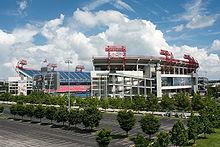
Nashville has many professional sports teams, most notably the Nashville Predators of the National Hockey League and the Tennessee Titans of the National Football League. Several other pro sports teams also call Nashville home, as does the NCAA college football Music City Bowl. Nashville is also home to the Fairgrounds Speedway, a NASCAR Whelen All-American Series racetrack.
Nashville is also home to four Division I athletic programs.
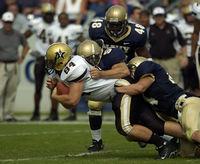
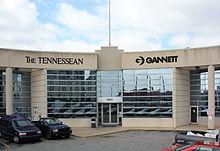
The daily newspaper in Nashville is The Tennessean, which, until 1998, competed fiercely with the Nashville Banner, another daily paper that was housed in the same building under a joint-operating agreement. The Tennessean is the city's most widely circulated newspaper, while a smaller free daily called The City Paper shares the Nashville market. Online news service NashvillePost.com competes with the printed dailies to break local and state news. Several weekly papers are also published in Nashville, including The Nashville Pride, Nashville Business Journal, Nashville Scene and The Tennessee Tribune. Historically, The Tennessean was associated with a broadly liberal editorial policy, while The Banner carried staunchly conservative views in its editorial pages; The Banner's heritage is carried on these days by The City Paper. The Nashville Scene is the area's alternative weekly broadsheet. The Nashville Pride is aimed towards community development and serves Nashville's entrepreneurial population.
Nashville is home to eleven broadcast television stations, although most households are served by direct cable network connections. Comcast Cable has a monopoly on terrestrial cable service in Davidson County (but not throughout the entire media market). Nashville is ranked as the 29th largest television market in the United States.
Nashville is also home to cable networks Country Music Television (CMT), Great American Country (GAC), and RFD-TV, among others. CMT's master control facilities are located in New York City with the other Viacom properties. The Top 20 Countdown and CMT Insider are taped in their Nashville studios. Nashville is also the home and namesake of the NBC country music singing competition Nashville Star, which broadcasts from the Opryland complex. Shop at Home Network was once based in Nashville, but the channel signed off in 2008.
Several dozen FM and AM radio stations broadcast in the Nashville area, including five college stations and one LPFM community radio station. Nashville is ranked as the 44th largest radio market in the United States. WSM-FM is owned by Cumulus Media and is 95.5 FM. WSM-AM, owned by Gaylord Entertainment Company, can be heard nationally on 650 AM or online at WSM Online from its studios located inside the Gaylord Opryland Resort & Convention Center. WSM is famous for carrying live broadcasts of the Grand Ole Opry, through which it helped spread the popularity of country music in America, and continues to broadcast country music throughout its broadcast day. WLAC, whose over-the-air signal is heard at 1510 AM, is a Clear Channel-owned talk station which was originally sponsored by the Life and Casualty Insurance Company of Tennessee, and its competitor WWTN is owned by Cumulus.
Several major motion pictures have been filmed in Nashville, including The Green Mile, The Last Castle, Gummo, The Thing Called Love, Two Weeks, Coal Miner's Daughter, Nashville, and Country Strong.
As the "home of country music", Nashville has become a major music recording and production center. All of the Big Four record labels, as well as numerous independent labels, have offices in Nashville, mostly in the Music Row area. Since the 1960s, Nashville has been the second biggest music production center (after New York) in the U.S. As of 2006, Nashville's music industry is estimated to have a total economic impact of US$6.4 billion per year and to contribute 19,000 jobs to the Nashville area.
Although Nashville is renowned as a music recording center and tourist destination, its largest industry is actually health care. Nashville is home to more than 250 health care companies, including Hospital Corporation of America, the largest private operator of hospitals in the world. As of 2006, it is estimated that the health care industry contributes US$18.3 billion per year and 94,000 jobs to the Nashville-area economy. The automotive industry is also becoming increasingly important for the entire Middle Tennessee region. Nissan North America moved its corporate headquarters in 2006 from Gardena, California (Los Angeles County) to Franklin, southwest of Nashville. Nissan also has its largest North American manufacturing plant in Smyrna, Tennessee. Largely as a result of the increased development of Nissan and other Japanese economic interests in the region, Japan moved its New Orleans consulate-general to Nashville's Palmer Plaza.
Other major industries in Nashville include insurance, finance, and publishing (especially religious publishing). The city hosts headquarters operations for several Protestant denominations, including the United Methodist Church, Southern Baptist Convention, National Baptist Convention USA, and the National Association of Free Will Baptists.
Fortune 500 companies within Nashville include Dell, HCA and Dollar General.
According to the City's 2010 Comprehensive Annual Financial Report, the top employers in the city are:
The data below is for all of Metropolitan Nashville-Davidson County, including other incorporated cities within the consolidated city aecounty (such as Belle Meade and Berry Hill). See Nashville-Davidson (balance) for demographic data on Nashville-Davidson County excluding separately incorporated cities.
According to the 2009 American Community Survey, there were 628,434 people residing in the city. The population density was 1,204.2 people per square mile (465/km ²). There were 282,452 housing units at an average density of 560.4 per square mile (216.4/km ²).
At the 2010 census, the racial makeup of the city was 60.5% White (56.3% non-Hispanic white), 28.4% African American, 0.3% American Indian and Alaska Native, 3.1% Asian, 0.1% Native Hawaiian and Other Pacific Islander, 2.5% from two or more races. 10.0% of the total population was of Hispanic or Latino origin (they may be of any race). The non-Hispanic White population was 79.5% in 1970.
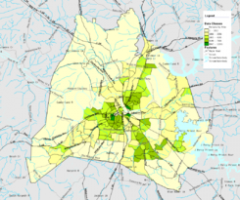
There were 254,651 households and 141,469 families (55.6% of households). Of households with families, 37.2% had married couples living together, 14.1% had a female householder with no husband present, and 4.2% had a male householder with no wife present. 27.9% of all households had children under the age of 18, and 18.8% had at least one member 65 years of age or older. Of the 44.4% of households that are non-families, 36.2% were individuals and 8.2% had someone living alone who was 65 years of age or older. The average household size was 2.38 and the average family size was 3.16.
The age distribution was 22% under 18, 10% from 18 to 24, 33% from 25 to 44, 24% from 45 to 64, and 11% who were 65 or older. The median age was 34.2 years. For every 100 females there were 94.1 males. For every 100 females age 18 and over, there were 91.7 males.
The median income for a household in the city was $46,280, and the median income for a family was $56,923. Males with a year-round, full-time job had a median income of $40,037 versus $34,269 for females. The per capita income for the city was $28,056. About 12.2% of families and 16.2% of the population were below the poverty line, including 26.0% of those under age 18 and 10.0% of those age 65 or over. Of residents 25 or older, 33.4% have a bachelor's degree or higher.
Because of its relatively low cost of living and large job market, Nashville has become a popular city for immigrants. Nashville's foreign-born population more than tripled in size between 1990 and 2000, increasing from 12,662 to 39,596. Large groups of Mexicans, Kurds, Vietnamese, Laotians, Cambodians, Arabs, and Bantus call Nashville home, among other groups. There are also smaller communities of Pashtuns from Afghanistan and Pakistan concentrated primarily in Antioch. Nashville has the largest Kurdish community in the United States, numbering approximately 11,000. About 60,000 Bhutanese refugees are being admitted to the U.S. and some of them will resettle in Nashville. During the Iraqi election of 2005, Nashville was one of the few international locations where Iraqi expatriates could vote. The American Jewish community in Nashville dates back over 150 years, and numbered about 6,500 in 2001.
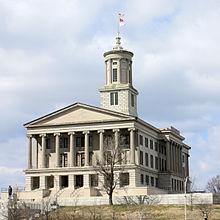
The city of Nashville and Davidson County merged in 1963 as a way for Nashville to combat the problems of urban sprawl. The combined entity is officially known as "the Metropolitan Government of Nashville and Davidson County", and is popularly known as "Metro Nashville" or simply "Metro". It offers services such as police, fire, electricity, water and sewage treatment. When the Metro government was formed in 1963, the government was split into two service districts aethe "urban services district" and the "general services district." The urban services district encompasses the 1963 boundaries of the former City of Nashville, and the general services district includes the remainder of Davidson County. There are six smaller municipalities within the consolidated city-county: Belle Meade, Berry Hill, Forest Hills, Oak Hill, Goodlettsville (partially), and Ridgetop (partially). These municipalities use a two-tier system of government, with the smaller municipality typically providing police services and the Metro Nashville government providing most other services. Previously, the city of Lakewood also had a separate charter. However, Lakewood residents voted in 2010 and 2011 to dissolve its city charter and join the metropolitan government, with both votes passing.
Nashville is governed by a mayor, vice-mayor, and 40-member Metropolitan Council. It uses the strong-mayor form of the mayor aecouncil system. The current mayor of Nashville is Karl Dean. The Metropolitan Council is the legislative body of government for Nashville and Davidson County. There are five council members who are elected at large and 35 council members that represent individual districts. The Metro Council has regular meetings that are presided over by the vice-mayor, who is currently Diane Neighbors. The Metro Council meets on the first and third Tuesday of each month at 6:00 pm, according to the Metropolitan Charter.
Nashville is home to the Tennessee Supreme Court's courthouse for Middle Tennessee.
Nashville has been a Democratic stronghold since at least the end of Reconstruction. While local elections are officially nonpartisan, nearly all of the city's elected officials are known to be Democrats. At the state level, Democrats hold all but two of the city's 10 state house districts and all but one of the city's four state senate districts. Pockets of Republican influence exist in the wealthier portions of the city, but they are usually no match for the overwhelming Democratic trend in the rest of the city.
Democrats are no less dominant at the federal level. Over the past 100 years, Democratic presidential candidates have carried Nashville/Davidson County in four out of five elections. Normally, Democrats carry Nashville at the presidential level with relatively little difficulty, even in years when they lose the state as a whole.In the 2000 presidential election, Al Gore carried Nashville with over 59% of the vote even as he narrowly lost his home state. In the 2004 election, John Kerry carried Nashville with 55% of the vote even as George W. Bush won the state by 14 points. In 2008, Barack Obama carried Nashville with 60% of the vote even as John McCain won Tennessee by 15 points.
At the federal level, Nashville is split between two congressional districts. Nearly all of the city is in the 5th District, currently represented by Democrat Jim Cooper. A Republican has not represented a significant portion of Nashville since 1874. While Republicans made a few spirited challenges in the mid-1960s and early 1970s, they have not made a serious bid for the district since 1972, when the Republican candidate gained only 38% of the vote even as Nixon carried the district in the presidential election by a large margin. The district's best-known congressman was probably Jo Byrns, who represented the district from 1909 to 1936 and was Speaker of the House for much of Franklin Roosevelt's first term as President. Another nationally prominent congressman from Nashville was Percy Priest, who represented the district from 1941 to 1956 and was House Majority Whip from 1949 to 1953. Former mayors Richard Fulton and Bill Boner also sat in the U.S. House before assuming the Metro mayoral office.
All of Nashville was located in a single district for most of the time from Reconstruction until the 2000 Census, when a small portion of southwestern Nashville was drawn into the heavily Republican 7th District. That district is currently represented by Marsha Blackburn of neighboring Williamson County; Blackburn represented much of the Nashville share of the 7th in the state senate from 1998 to 2002.
The city is served by the Metropolitan Nashville Public Schools.
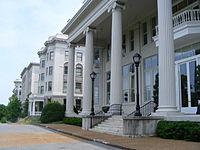
Nashville is often labeled the "Athens of the South" due to the many colleges and universities in the city and metropolitan area. The colleges and universities in Nashville include American Baptist College, Aquinas College, Belmont University, Daymar Institute, Fisk University, John A. Gupton College, Lipscomb University, Meharry Medical College, Nossi College, Nashville School of Law, Nashville Auto Diesel College (a NAFTC Training Center), Nashville State Community College, Tennessee State University, Trevecca Nazarene University, Vanderbilt University, Watkins College of Art, Design & Film, and Welch College.
Within 30 miles (48 km) of Nashville in Murfreesboro is Middle Tennessee State University (MTSU), a full-sized public university with Tennessee's largest undergraduate population. Enrollment in post-secondary education in Nashville is around 43,000. Within the Nashville Metropolitan Statistical Area aewhich includes MTSU, Cumberland University (Lebanon), Volunteer State Community College (Gallatin), Daymar Institute, and O'More College of Design (Franklin) aetotal enrollment exceeds 74,000. Within a 40 miles (64 km) radius are Austin Peay State University (Clarksville) and Columbia State Community College (Columbia), enrolling an additional 13,600.
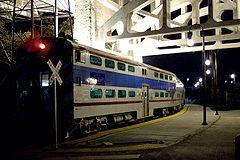
Nashville is centrally located at the crossroads of three Interstate Highways: I-40, I-24, and I-65. Interstate 440 is a bypass route connecting I-40, I-65, and I-24 south of downtown Nashville. Briley Parkway connects the north side of the city and its interstates. A number of arterial surface roads called "pikes" radiate from the city center; many carry the names of nearby towns to which they lead. Among these are Clarksville Pike, Gallatin Pike, Lebanon Pike, Murfreesboro Pike, Nolensville Pike, and Franklin Pike.
The Metropolitan Transit Authority provides bus transit within the city, out of a newly built hub station downtown. Routes utilize a hub and spoke method. Expansion plans include use of Bus rapid transit for new routes, with the possibility for local rail service at some point in the future.
Nashville is considered a gateway city for rail and air traffic for the Piedmont Atlantic Megaregion.
The city is served by Nashville International Airport (BNA), which was a hub for American Airlines between 1986 and 1995 and is now a focus city for Southwest Airlines. During 2011, Nashville International was the 34th busiest passenger airport in the U.S. with a total of 4,673,047 passenger boardings. Major airlines serving Nashville include American Airlines, Delta Air Lines, Frontier Airlines, Southwest Airlines, United Airlines, US Airways, and AirCanada.
Although it is a major rail hub, with a large CSX Transportation freight rail yard, Nashville is one of the largest cities in the U.S. not served by Amtrak.
Nashville launched a passenger commuter rail system called the Music City Star on September 18, 2006. The only currently operational leg of the system connects the city of Lebanon to downtown Nashville at the Nashville Riverfront. Legs to Clarksville, Murfreesboro and Gallatin are currently in the feasibility study stage. The system plan includes seven legs connecting Nashville to surrounding suburbs.
Notable bridges in the city are:
Nashville is a colorful, well-known city in several different arenas. As such, it has earned various sobriquets, including:
Nashville is an active participant in the Sister Cities program and has relationships with the following towns:
 North America portal
North America portal
Word Count: 5872





